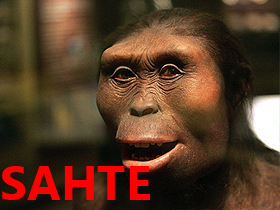Paleoanthropology is a branch of science that studies the origin and developmental process of man. Studies in this field are backed up by many other branches of science, but the greatest use is made of information obtained from fossils.
However, as in many other branches of science, fossils are interpreted in the light of the assumptions of the theory of evolution. Findings obtained from the fields of archaeology and ethnology are interpreted in a biased manner so as to demonstrate the physical and mental development of man's supposed forerunners, who must have existed according to the claims of the theory of evolution.
Despite being an evolutionist, the Arizona State University anthropologist Geoffrey Clark admitted as much in a text published in 1997:
We select among alternative sets of research conclusions in accordance with our biases and preconceptions-a process that is, at once, both political and subjective.… paleoanthropology has the form but not the substance of a science.170
Niles Eldredge of Harvard University and Ian Tattersall of the American Museum of Natural History, two of the USA's leading paleontologists, comment on paleontological findings:
It is a myth that the evolutionary histories of living things are essentially a matter of discovery. If this were true, one could confidently expect that as more hominid fossils were found the story of human evolution would become clearer. Whereas if anything, the opposite has occurred.171
Many other evolutionist experts on the subject also harbor pessimistic ideas about the very theory they support. Henry Gee, Nature magazine's best-known writer, says that "between about 10 and 5 million years ago-several thousand generations of living creatures-can be fitted into a small box." The conclusion Gee draws from this is very interesting:
To take a line of fossils and claim that they represent a lineage is not a scientific hypothesis that can be tested, but an assertion that carries the same validity as a bedtime story-amusing, perhaps even instructive, but not scientific.172
Why is this branch of science, offering no evidence for the theory of evolution, regarded as so important by evolutionists? Why is every fossil discovery interpreted in such a biased, exaggerated manner? At a meeting held at the Biology Teachers' Association, the evolutionist Greg Kirby described this mentality:
If you were to spend your life picking up bones and finding little fragments of head and little fragments of jaw, there is a very strong desire there to exaggerate the importance of those fragments.173
No scientific paleoanthropological findings provide any support for evolution. All the "proofs" that evolutionists offer are fossils one-sidedly interpreted in order to deny the existence of Allah, the supreme Creator.
170. G. A. Clark, C. M. Willermet, Conceptual Issues in Modern Human Origins Research, New York: Aldine de Gruyter, 1997, p. 76.
171. Niles Eldredge, Ian Tattersall, The Myths of Human Evolution, pp. 126-127.
172. Henry Gee, In Search of Deep Time, New York: The Free Press, 1999, pp. 116-117.
173. http://www.catholicintl.com/noncatholicissues/devolution.htm


